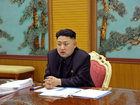Spotlight
Iranian students chanted anti-government slogans and scuffled with counter-protesters in the latest display of anger at the country's clerical leaders, who also face a U.S. military build-up aimed at pressuring them into a nuclear deal.
 Full Story
Full Story
The USS Gerald R. Ford aircraft carrier was seen entering the Mediterranean Sea on Friday, where it was ordered by U.S. President Donald Trump as part of a massive military buildup in the Middle East.
 Full Story
Full Story
Serbia has urged its citizens in Iran to leave the country "as soon as possible", after U.S. President Donald Trump threatened military action over the Islamic republic's nuclear program.
 Full Story
Full Story
For a year, Donald Trump has governed the United States with little standing in his way.
 Full Story
Full Story
North Korean leader Kim Jong Un vowed to lift living standards as he opened a landmark congress, state media said Friday, offering a glimpse of economic strains within the sanctions-hit nation.
 Full Story
Full Story
Even now, safely in her new home of Estonia, Inna Vnukova says she can't purge the terrifying memory of living under Russian occupation in eastern Ukraine early in the war and her family's harrowing escape.
They hid in a damp basement for days in their village of Kudriashivka after Russia's full-scale invasion in February 2022. In the streets, soldiers waving machine guns bullied residents, set up checkpoints and looted homes. There was constant shelling.
 Full Story
Full Story
U.S. President Donald Trump's administration denounced "terrorism" in France and warned of left-wing violence after a far-right activist was beaten to death.
 Full Story
Full Story
Britain's former prince Andrew was arrested and released under investigation in a day of drama. What is he being probed for? Could he be jailed? And what next?
 Full Story
Full Story
Iran has warned that U.S. bases, facilities and assets would be "legitimate targets" if the United States follows through on its military threats and attacks.
 Full Story
Full Story
U.S. President Donald Trump said on Thursday that Iran must make a "meaningful deal" in negotiations with Washington in the next 10 days or else "bad things happen", as he deployed warships, fighter jets and other military hardware to the region.
 Full Story
Full Story




